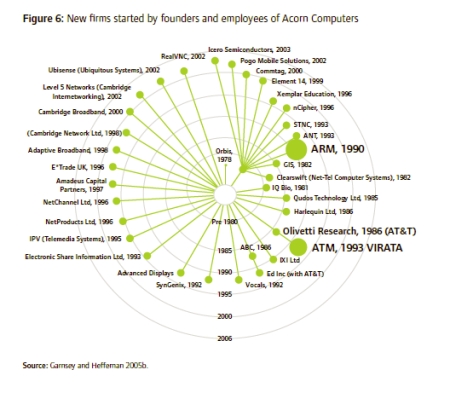Effectiveness of Incubators
NESTA is the National Endowment for Science, Technology and the Arts - an independent body with a mission to make the UK more innovative - it is funded by an endowment from the UK National Lottery. It makes investments, and also publishes research.
Yesterday's blog post was notes about a visit to PlugandPlay Tech Center - which is primarily a place for startups to rent office space on extremely flexible terms; it also offers shared space, access to advice, and other things which might help startups get going more quickly (or fail an idea more quickly). Either way, this usually saves time and money compared to doing it alone. PlugandPlay is one example of an incubator. Y combinator, of course, is another. NESTA doesn't mention either of these big examples in its recent publication, focusing instead on Cambridge, England, and on Sweden for examples of success. From the perspective of the Valley, it seems odd to ignore these big operations.

out of an Acorn ...
Nevertheless, here are some useful quotes from the Incubation for Growth paper.
"Absolute measures of incubation are impractical, but performance indicators are useful"
" Business models have changed over time. Since 2005 there has been a reported increase in the cost per job created each year in business incubation in Europe. Some incubators now offer equity finance, and some equity investors offer incubation, with an unclear distinction between both. The challenge for incubators and their funding bodies is to capture some of the value created for incubatees. Generating revenue from services when clients are resource constrained is often not possible without subsidies from public bodies. Corporate funded incubators typically require a strong strategic fit of incubatees with the corporation, which is not appropriate for all ventures. Incubators with mixed funding may encounter principal-agentproblems as they attempt to meet multiple objectives."
"Longer term, the challenge for incubators is to help develop a relatively small number of high-growth,
internationally competitive companies, even if these companies realise their success after incubation."
"Here incubation diverges from venture funding. Unlike finance managers reliant on realizing an investment portfolio at a significant profit, incubator managers have several sources of income – rent, grants, public or private consulting, conferencing and other services, share options – and so also numerous constituencies to please, whose interests may not always be obviously reconcilable. Part of the craft of the incubator management team is to understand such conflicts and resolve them so far as possible, while retaining ‘negative capability’ – an ability to improvise and live with the doubts and uncertainties inherent in an entrepreneurial environment."
This lengthy report assumes that an incubator is primarily focussed on real estate, renting out space to startups, and that it is therefor geographically anchored to one place.
It is possible that other models, building on the 'tech team in one place, sales and product marketing in the large marketplace' principle, which works for startups from small countries, could work.
3 March 2012 adding reference to Nesta Startup Factories list
29 June 2012 update to add Forbes top ten list of incubators (there's still no agreement about whether these things are incubators or accelerators)
26 July 2012 update to link to Jed Christiansen's list of accelerators http://www.seed-db.com/accelerators
Report
http://www.nesta.org.uk/library/documents/IncubationforGrowthv11.pdf
Y-combinator numbers June 2011 http://ycombinator.com/nums.html
http://startupfactories.eu/
http://www.forbes.com/sites/tomiogeron/2012/04/30/top-tech-incubators-as...
Cunning Systems evaluates product and service ideas in computing and communications. If you would like to discuss an idea, contact us at info@cunningsystems.com
- Anne's blog
- Login to post comments